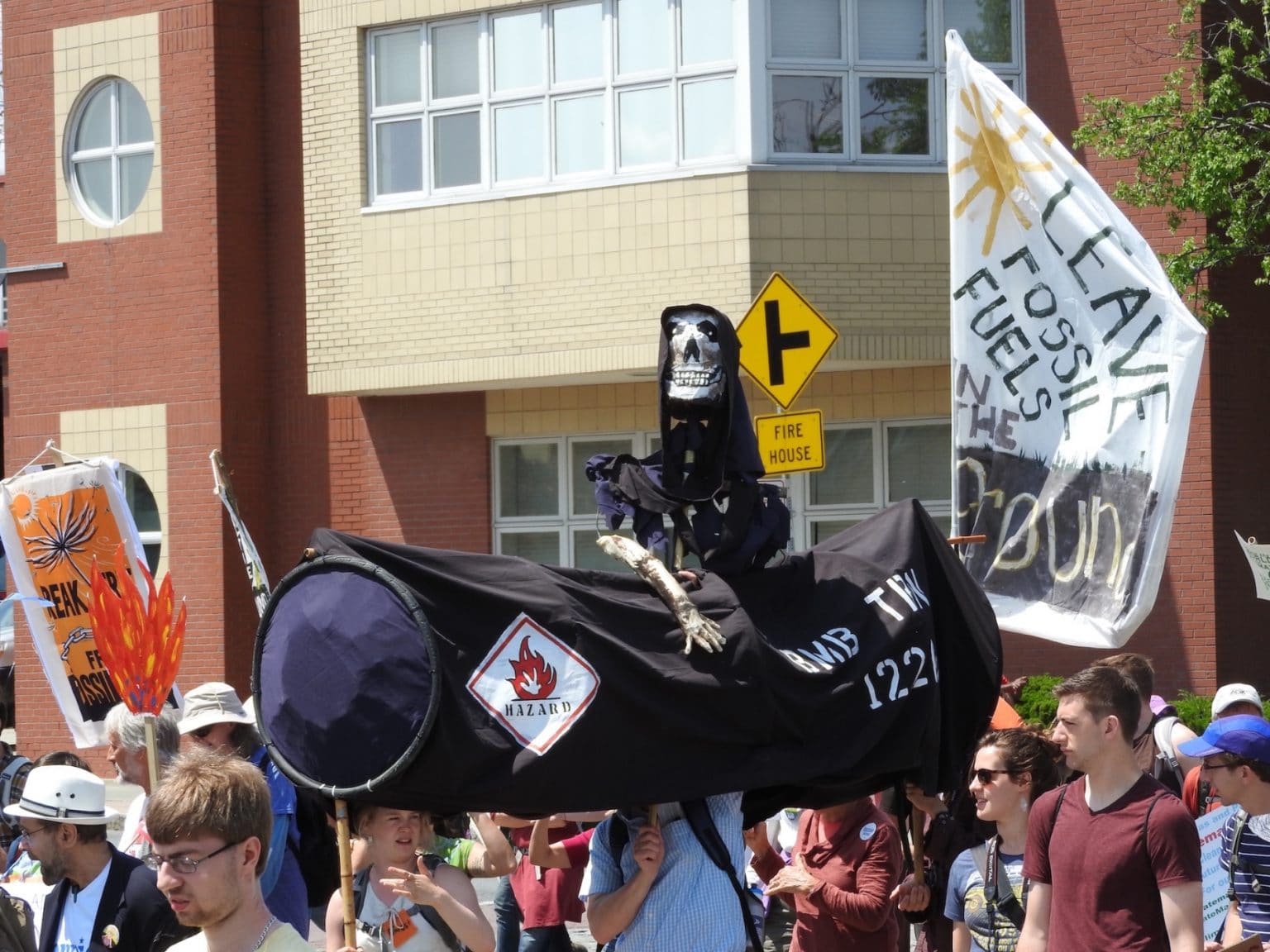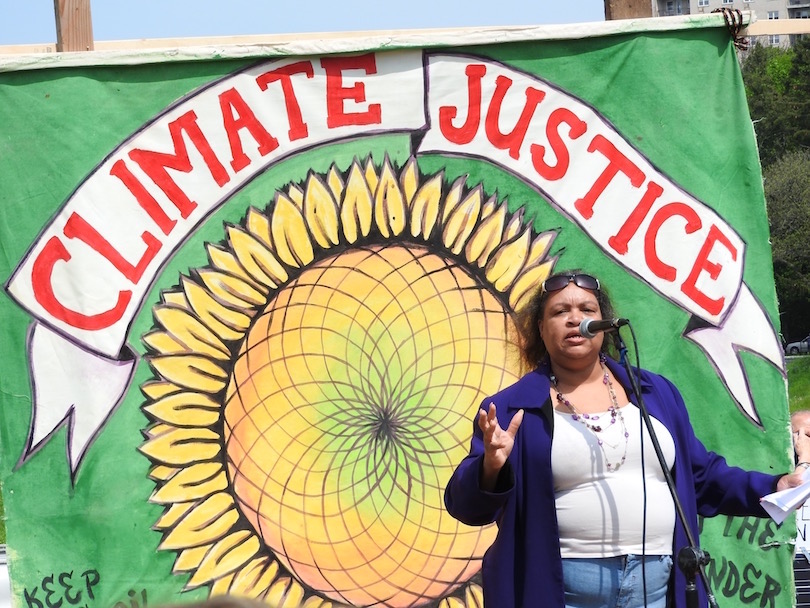“I would agree with the opponents. This is not about saving jobs…This is about profits. But gee, what is wrong with profits?”
Those were the words of San Luis Obispo County Planning Commissioner Jim Irving, explaining why he was voting for a project to build a rail spur to the Phillips 66 Santa Maria Refinery so that the refinery can receive oil by rail.
It is a safe bet that Jim Irving hasn’t been to Lac-Megantic, where almost three years ago a very profitable oil train derailed and exploded in the middle of downtown. The immediate damage was 47 lives lost, a massive oil spill, and the burning and contamination of the town center.
Nearly three years later, the downtown has yet to be rebuilt. And as we reported on DeSmog, there were many reasons the Lac-Megantic accident occurred. Averting any one of them could have prevented the accident. All were the result of corporate cost-cutting that put profits ahead of safety.
Also to blame were government regulators who allowed corporations to not invest in safety.
The locomotive engine fire that was the initial cause of the event? Faulty cost-saving repair.
The fact that regulators allowed full oil trains to be parked on a hill above a town, unmanned? Staffing cost savings for railroads.
The “19th century technology” air brakes that failed? More profits over safety.
Poor or non-existent employee training? More savings.
And how about those government regulators’ role in this? How could all of these moves to put profits over safety be allowed? The Globe and Mail looked at all the evidence and pointed the finger directly at the regulators.
There is one federal body that is ultimately responsible for the oversight of Canada’s railways: Transport Canada. The Lac-Mégantic disaster falls squarely at its feet.
It was recently revealed that the government of Canada contributed $75 million to the fund for the victims of Lac-Megantic to avoid further litigation. If they weren’t at fault, why would they pay up?
If you want to ask why allowing the pursuit of profits above all other concerns is a problem — Lac-Megantic is your answer.
Profits Over Safety: The Rule, Not the Exception
The old air braking system that was involved in Lac-Megantic is the standard for all oil trains. There are modern braking systems known as electronically controlled pneumatic (ECP) brakes that have been described as “a quantum improvement in rail safety” by Joseph Boardman, the former head of the Federal Railroad Administration. But this quantum improvement has not been implemented.
Cynthia Quarterman was in charge of the Pipeline and Hazardous Materials Safety Administration for the majority of the multi-year process when the new oil-by-rail regulations were developed, and based on that process, she believes ECP brakes are a top priority.
“The more I think about it, the more I think that the ECP brakes may be more important than the tank car itself,” Quarterman told USA Today. “Because it would stop the pileup of the cars when there’s a derailment or when there’s a need to brake in a very quick fashion.”
So why aren’t ECP brakes required on oil trains? As DeSmog reported in March of 2015, the industry explained its opposition to ECP brakes in a presentation to regulators, and the opposition included the argument that safer brakes would be “too costly.”
And of course there is the issue of the tank cars used to move the dangerous oil. When the fracking boom happened in North Dakota and there weren’t pipelines to move the oil, the industry quickly built rail loading facilities.
Did the industry also build new safe tank cars to move the oil? No. They began filling the readily available DOT-111 tank cars with oil and started rolling them across North America through big cities and small towns — including Lac-Megantic.
The problem was that the DOT-111s were not designed to move flammable materials like Bakken crude oil, but were made to move things like molasses and corn oil.
But there was money to be made – so it was full-speed ahead with the DOT-111s for Bakken crude.
Shipping Bakken crude oil in DOT-111s has been called “an unacceptable public risk” by a member of the National Transportation Safety Board. But it continues anyway because it is profitable. Gee, what could go wrong with that?
The oil could be made safe to transport through a process known as stabilization. But that would require building stabilizing infrastructure in places like North Dakota. That would cut into profits. So it hasn’t been done.
In testimony to the North Dakota Industrial Commission about the proposed regulations to requireoil stabilization, Tony Lucero of oil producer Enerplus explained the reality:
“The flammable characteristics of our product are actually a big piece of why this product is so valuable. That is why we can make these very valuable products like gasoline and jet fuel.”
And so there are no regulations to stabilize the oil because it would be less profitable.
What is wrong with profits? Dangerous oil in unsafe cars with 19th century technology brakes traveling though many North American cities is a good starting point to answer that question.
Profits Buy Plenty of Lobbyists
In January, Sen. Elizabeth Warren (D-MA) released the report “Rigged Justice – How Weak Enforcement Lets Corporate Offenders Off Easy” detailing what is known as regulatory capture — essentially using corporate profits to buy influence over regulators responsible for improving safety. Like the ones who the Globe and Mail said failed the people of Lac-Megantic.
“When it comes to undue industry influence, our rulemaking process is broken from start to finish,” Warren explained in March while discussing the report. “At every stage – from the months before a rule is proposed to the final decision of a court hearing a challenge to that rule – the existing process is loaded with opportunities for powerful industry groups to tilt the scales in their favor.”
The math is simple. It is much cheaper to buy lobbyists and influence than it is to invest in safety. And that is what is wrong with an approach that puts the pursuit of profits above all else.
We Can’t Take A Chance That Things Will Be Alright
While the oil and rail industries’ pursuit of profits was championed in California on Monday, a similar discussion was happening on the East Coast in Albany, NY. Albany is the largest oil hub on the East Coast and all of that oil comes by rail.
Now there is a proposal to build a pipeline from Albany to the seaport in Linden, NJ. The pipeline would be fed by oil trains that would arrive in Albany. While it was mostly a symbolic vote — unlike the one in California — the Albany city council voted to oppose the Pilgrim Pipeline this week.
In the public comment period, local Pastor McKinley Johnson, whose church is across the highway from the oil train facility, explained his opposition to the pipeline and more oil trains.
“It is time for us to take a stand,” said Johnson “We can’t take a chance that things will be alright.”
And he is right that this is about taking chances. The oil and rail industries are gambling that an event like Lac-Megantic won’t happen in a big city like Chicago — knowing full well that the proper safety measures are not in place to prevent it.
So far they have been really lucky — and very profitable.
This past weekend, Albany was the site of one of the worldwide Break Free From Fossil Fuels events, and the issue of the oil “bomb trains” was front and center. City council member Vivian Kornegay, who represents the community that lives directly alongside the rail yards where the oil is offloaded, was one of the featured speakers.
She repeatedly made the point that her constituents were taking all of the risk with the trains and getting no reward, saying, “We assume 100% of the risk…and miniscule benefits.”
If you are an oil company in pursuit of profits, that is exactly how you want it.
Vivian Kornegay addresses Break Free rally in Albany, NY Photo credit: Justin Mikulka
Blog Image Credit: Justin Mikulka
Subscribe to our newsletter
Stay up to date with DeSmog news and alerts








